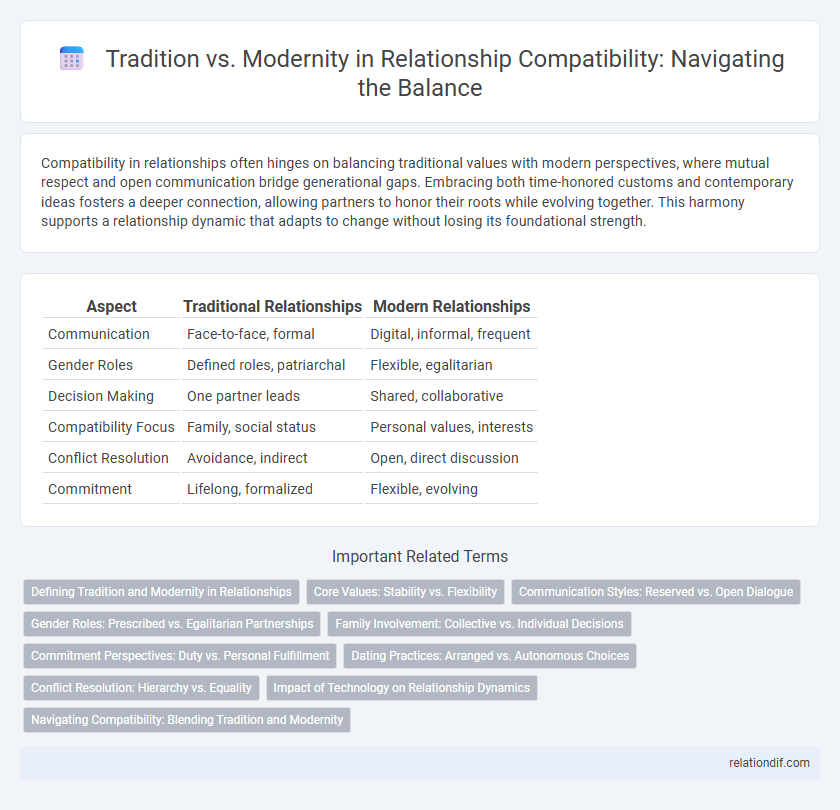Compatibility in relationships often hinges on balancing traditional values with modern perspectives, where mutual respect and open communication bridge generational gaps. Embracing both time-honored customs and contemporary ideas fosters a deeper connection, allowing partners to honor their roots while evolving together. This harmony supports a relationship dynamic that adapts to change without losing its foundational strength.
Table of Comparison
| Aspect | Traditional Relationships | Modern Relationships |
|---|---|---|
| Communication | Face-to-face, formal | Digital, informal, frequent |
| Gender Roles | Defined roles, patriarchal | Flexible, egalitarian |
| Decision Making | One partner leads | Shared, collaborative |
| Compatibility Focus | Family, social status | Personal values, interests |
| Conflict Resolution | Avoidance, indirect | Open, direct discussion |
| Commitment | Lifelong, formalized | Flexible, evolving |
Defining Tradition and Modernity in Relationships
Tradition in relationships emphasizes long-established roles, cultural norms, and family expectations that prioritize loyalty, commitment, and structured gender roles. Modernity challenges these conventions by promoting egalitarian values, flexible roles, and open communication that adapt to contemporary social dynamics. Understanding the balance between tradition and modernity is essential for fostering compatibility that respects heritage while embracing individual growth.
Core Values: Stability vs. Flexibility
Core values of stability emphasize long-term commitment, consistent routines, and maintaining established roles, often seen in traditional relationships. Flexibility prioritizes adaptability, open communication, and evolving roles to meet changing needs, characteristic of modern relationships. Balancing stability with flexibility is crucial for compatibility, enabling couples to honor foundational principles while navigating life's uncertainties together.
Communication Styles: Reserved vs. Open Dialogue
Traditional relationships often feature reserved communication styles where emotions and conflicts are minimally expressed, prioritizing harmony and respect. Modern relationships tend to embrace open dialogue, encouraging transparency and emotional sharing to foster deeper understanding and connection. Recognizing and adapting to these differing communication preferences is crucial for compatibility in mixed-style partnerships.
Gender Roles: Prescribed vs. Egalitarian Partnerships
Traditional relationships often follow prescribed gender roles where men are expected to be providers and women caregivers, fostering clear but rigid compatibility expectations. Modern egalitarian partnerships emphasize equal responsibilities and shared decision-making, promoting flexibility and mutual respect in compatibility. Balancing these perspectives can enhance relationship satisfaction by aligning individual values with contemporary social norms.
Family Involvement: Collective vs. Individual Decisions
Family involvement in relationships often reflects a tension between collective decision-making, where traditions prioritize the input and approval of extended family members, and modern approaches that emphasize individual autonomy and personal choice. In traditional cultures, families play a central role in selecting partners and resolving conflicts, reinforcing social cohesion and shared values. Contemporary relationships increasingly favor private decision-making, promoting independence and aligning with evolving social norms that prioritize self-expression and personal happiness.
Commitment Perspectives: Duty vs. Personal Fulfillment
Traditional commitment perspectives emphasize duty, prioritizing family obligations, social expectations, and long-term stability in relationships. Modern views focus on personal fulfillment, valuing emotional satisfaction, individual growth, and mutual happiness as key drivers of commitment. Balancing these opposing perspectives requires understanding cultural values and communication styles to strengthen relationship compatibility.
Dating Practices: Arranged vs. Autonomous Choices
Dating practices reveal stark contrasts between tradition and modernity, where arranged unions prioritize family involvement and cultural continuity, while autonomous choices emphasize personal freedom and individual compatibility. Traditional arrangements often rely on communal approval and established social norms, whereas modern dating embraces self-expression, digital platforms, and diverse preferences. Compatibility in relationships increasingly depends on balancing respect for cultural heritage with evolving expectations of autonomy and mutual understanding.
Conflict Resolution: Hierarchy vs. Equality
Traditional relationships often rely on hierarchical structures where conflict resolution follows established roles and authority, fostering predictability but sometimes suppressing open communication. Modern relationships emphasize equality, encouraging mutual respect and dialogue to resolve conflicts collaboratively, promoting emotional intimacy and shared decision-making. Balancing hierarchy and equality in conflict resolution can enhance compatibility by integrating respect for experience with the need for inclusive communication.
Impact of Technology on Relationship Dynamics
Technology reshapes relationship dynamics by enhancing communication through instant messaging, video calls, and social media, fostering closer connections despite physical distance. However, excessive reliance on digital platforms can lead to misunderstandings, reduced face-to-face interaction, and challenges in emotional intimacy. Balancing traditional communication methods with modern technological tools is essential to maintaining compatibility and emotional depth in contemporary relationships.
Navigating Compatibility: Blending Tradition and Modernity
Navigating compatibility in relationships requires blending tradition and modernity to respect cultural roots while embracing contemporary values. Prioritizing open communication and mutual understanding helps partners balance traditional expectations with modern lifestyles. Emphasizing shared goals and adaptability fosters harmony and strengthens the relationship's foundation.
Tradition vs modernity in relationships Infographic

 relationdif.com
relationdif.com